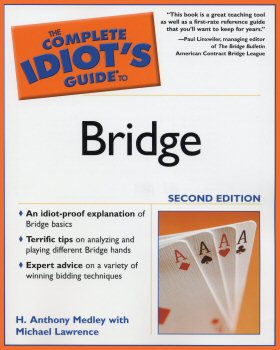| The first edition of Complete Idiot's Guide to Bridge by H. Anthony Medley was the fastest selling beginning bridge book, going through more than 10 printings. This updated Second Edition includes some modern advanced bidding systems and conventions, like Two over One, a system used by many modern tournament players, Roman Key Card Blackwood, New Minor Forcing, Reverse Drury, Forcing No Trump, and others. Also included is a detailed Guide to Bids and Responses, along with the most detailed, 12-page Glossary ever published, as well as examples to make learning the game even easier. Click book to order. | ||
| Chaos Theory (10/10) by Tony Medley Running Time: 85 minutes. Many films start out with people talking in unrealistic ways, ways only a screenwriter could invent. As a result, the verisimilitude of the film is destroyed at the outset. This, to the contrary, starts with Ed (Mike Erwin) a fledgling bridegroom unsure about his potential wife, Jesse (Elisabeth Harnois as the grown up/Matreya Fedor as the seven-year-old), having discovered her infidelity. He mistakenly wanders into the bar where he finds his potential father-in-law, Frank Allen (Ryan Reynolds) who engages him in an unwanted, unexpected contentious conversation about life. Suddenly we are thrown into Frank’s story of his life with his wife, Susan (Emily Mortimer). Frank epitomizes the living of a controlled life. The author of the bestselling “the Five Minute Efficiency Trainer,” he lives his life strictly in accordance with schedule and index cards. One morning Susan decides to throw a monkey wrench into Frank’s annoying control by setting his clock 10 minutes fast. Unfortunately, instead of setting it fast, she sets it 10 minutes slow. The result throws their life into, well, chaos. Reynolds’ portrayal of Frank and the dilemmas into which he is thrust is spot on brilliant. This is a film that goes from one unexpected surprise to another and Frank is awhirl in events totally beyond his control. This film has scenes so funny I was laughing out loud, uncontrollably, you should pardon the expression. But it also has scenes of pathos. I think it’s the first film I’ve ever seen that made me feel how a child’s view of life is so myopically imprisoned in the life its parents give it, parents who are so young, too young, really to realize that they are creating a world for their child. This isn’t a major part of the film, but Fedor, who plays the youthful Jesse, gives such a remarkable performance of love and devotion to her parents, and especially to Frank, that it really got me to thinking about how the only thing a child knows is the world presented to it by its parents. It’s not only a terrific responsibility, it’s a terrific privilege. I wonder how many parents put themselves into their children’s’ brains and realize how much they shape their lives and their view of life. Life as perceived by a young child is totally drawn by its parents. Maybe this is obvious, but for some reason this film drew it out into the open for me. So many things happen to Frank that this film that starts out relatively slowly suddenly becomes a comedy of erroneous conclusions that lead to a film that continues to come up with surprises. Not the least of which involves Frank’s best friend Buddy (Stuart Townsend), who had the hots for Susan before she married Frank. Buddy is a Porsche-driving playboy who doesn’t take life seriously. The story was inspired by screenwriter Daniel Taplitz’s bout with cancer. He says, “I didn’t want to write about that, but I was interested in writing about what somebody does when they’re metaphorically pushed off a cliff both physically and emotionally—how one piece of information can potentially change their life and how they might have to reconstruct that life.” Fortunately, Taplitz was in luck in that Marcos Siega was chosen to direct. He has produced a brilliant film. Siega is more interested in telling the story well than in putting some sort of unique mark on the film in the terms of close-ups and editing. “My style is not to have the camera constantly moving,” he says. “You don’t always have to cut to a close-up when someone walks in the door, you don’t need to cut to a reaction when someone’s being emotional, you should be able to sit on the shot and feel it.” Hooray for Siega, a director who recognizes when he has a terrific story told by exceptional actors, he doesn’t need to intrude by inserting egotistical directorial hijinks. This is a gem of a film that is not getting a wide release, so many people won’t see it. That will be to their detriment. With so many horrible films put out today that receive huge publicity, a little film like this gets missed. Too bad. April 3, 2008 |
||
|
|
||
